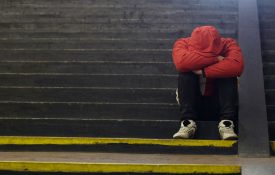-

Childhood Bullying Linked to Health Risks in Adulthood
Findings from a longitudinal study suggest that childhood bullying may lead to long-lasting health consequences, impacting psychosocial risk factors for cardiovascular health well into adulthood.
-
Researchers Examine The Psychology Of Protest Movements
NPR: Social science researchers examine whether extreme protest tactics are an effective way for recruiting popular support. The public may not be relating to protesters like the way protesters aimed for. Well, the researchers wanted to study what happens when people protest. We all have intuitions about the effectiveness of protests, and protesters certainly have those intuitions as well. This was an attempt to actually measure whether those intuitions were accurate. I was speaking with Robb Willer. He's a sociologist and psychologist at Stanford University.
-

Group Rituals Can Make Us Biased Against Outsiders
Engaging in basic rituals — even arbitrary movements — can make us more likely to trust those who share the same ritual and less likely to trust those who don’t.
-
How to Trick People Into Saving Money
The Atlantic: Late last summer, Dawn Paquin started keeping her money on a prepaid debit card from Walmart instead of in a traditional checking account. The wages from her factory job—she works from 9 p.m. to 5 a.m., inspecting blades on industrial bread-slicing machines—now go directly onto the Visa-branded card, which she can use like a regular debit card, though unlike most debit cards, it is not linked to a checking or savings account. She made the switch after a $4 check she wrote to buy coffee for herself and a friend tipped her checking account below the required minimum and triggered $100 in overdraft fees. This was before she got the factory gig, and she wasn’t working full-time.
-
People Have Limited Knowledge. What’s the Remedy? Nobody Knows
The New York Times: In “The Knowledge Illusion,” the cognitive scientists Steven Sloman and Philip Fernbach hammer another nail into the coffin of the rational individual. From the 17th century to the 20th century, Western thought depicted individual human beings as independent rational agents, and consequently made these mythical creatures the basis of modern society. Democracy is founded on the idea that the voter knows best, free market capitalism believes the customer is always right, and modern education tries to teach students to think for themselves. ...
-
Why We Shut Ourselves Off From Opposing Viewpoints
Pacific Standard: Interested in an opportunity to earn easy money? All you have to do is spend a couple of minutes reading eight statements that challenge your point of view on a political issue. Who would turn down that offer? According to revealing new research, the answer is: most of us. ... Our desire “to avoid listening to people with opposing ideals” is stronger than we realize, writes a research team led by University of Winnipeg psychologist Jeremy Frimer. It reports this pull is equally strong for liberals and conservatives, is not limited to Americans, and is rooted in deep-seated psychological needs.

